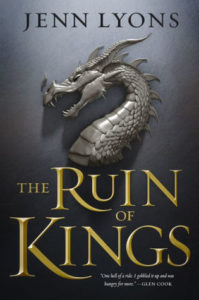
The Ruin of Kings opens Jenn Lyons’ five-book epic fantasy series, A Chorus of Dragons. Despite my love of epic fantasy, I hadn’t gotten to it when it came out. But Tor Books threw their considerable marketing muscle behind the opener—I couldn’t go anywhere in fantasy-leaning corners of the Internet in 2019 without hearing about it—and it has earned her two consecutive nominations for the Astounding Award for Best New Writer, so there are clearly quite a number of people who believe it has potential to be the next big thing in epic fantasy.
The Ruin of Kings follows one main character, Kihrin, through two different timelines, alternating chapters between a second character telling of Kihrin’s coming of age and Kihrin himself recounting his more recent history, starting with being sold into slavery. But what may look like a focused, personal story expands in scope rapidly, featuring kings and emperors, gods and demons, dragons and dark prophecies, and Kihrin is at the middle of more than his fair share.
Lyons delivers a quick hook with the frame narrative, telling from page one that the Capital was burned and that this sequence of stories told by a prisoner and his jailer will make everything clear. Combined with strong prose and immediate tension in both timelines–as young Kihrin witnesses a magical murder and slave Kihrin is pursued by a powerful enemy–the initial immersion is effortless.
Unfortunately, The Ruin of Kings loses its considerable momentum by the novel’s second half. And it’s hard to point to any one thing that was done especially badly, but rather a number of small mistakes without any real standout element to counterbalance them. The prose is strong in spurts, but the voice is inconsistent, with the faux-historical narration typical of epic fantasy regularly interrupted by jarringly modern phrases like “horrible, nonconsensual things” (as a description of rape), “I sucked at it,” or “note to self.” And the modern rape framing presages two more scenes where the characters awkwardly pause for explicit discussions of sexual morality, with the heroes, unsurprisingly, establishing opinions in keeping with the dominant contemporary Western sexual mores.
The plot and characters similarly show no egregious weakness but rather a few small mistakes and no clear strength. The main character is unrelentingly quippy and mouths off regularly at figures who, as far as he knows, are evil and capricious and could kill him on a whim. The side characters are a revolving door, with no overlap between the two timelines and a procession of similarly-named friends and enemies with a tendency to run together. And the plot cycles through myriad short and long-term objectives, sprinkling in so many big reveals that it’s hard to keep track of why each is important and sapping their emotional impact.
Unlike some epic openers, we do see some resolution, with a number of short-term arcs emphatically closed and long-term arcs remaining for future books. But because of the proliferation of objectives spreading attention so thin, the climax doesn’t feel as climactic as it should. And it never delivers convincing justification for the framing device, which proves to be not clever so much as unnecessarily complicated.
Overall, I saw flashes of quality with the prose and the enticing opener, but it’s not sustained long enough to really understand the hype. I’ve seen a number of other reviewers cite an extreme uptick in craftsmanship from book one to book two of the series, so perhaps this series grows into something special. But, despite a strong start, it’s an awkward opener that serves as a poor sales pitch for the rest of the series.
Can I use it for Bingo? Thankfully, it fits Book Club, 500+ Pages, First Person POV, and I believe (on a technicality) is hard mode for Witches.
Overall rating: 10 of Tar Vol’s 20. Two stars on Goodreads.
